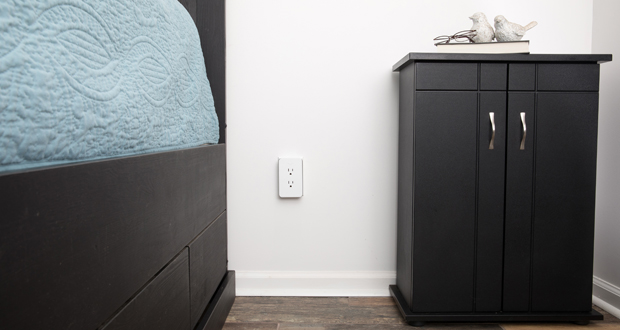Loud and distracting sounds outside the guestroom create a nightmare situation for both guests trying to get a good night’s sleep and for hotel owners. Traffic, TV volume from an adjacent room, nearby elevators, or hallway chatter are just a few of the disruptions that threaten to keep guests awake in the late hours of the night or early in the morning.
The solutions at hand range from equipping guestrooms with white noise machines to adding soundproofing materials into the guestroom in hopes of reducing noise complaints and making guests more comfortable. But now, an emerging technology has entered the mix after catching the eye of hotel owners on Kickstarter.
Nightingale is a sleep system that plugs into wall outlets and uses ambient sound on a proprietary sound curve, also called sound blankets, to mask noise. Unlike white noise machines, the devices are engineered to use a room’s walls to reflect sound so that the brain cannot localize the source of the sound. Instead, it blends into the room’s background noise.
David Sholkovitz, vice president of marketing at Cambridge Sound Management, says that in addition to the proprietary sound-masking method, what makes Nightingale unique is that the technology has been tested in a clinical sleep study performed by Harvard Medical School and Brigham and Women’s Hospital. The study showed that the technology helped participants fall asleep 38 percent faster than without it—an outcome comparable to taking an above-average dose of prescription sleep medication.
“It was the largest study ever of a sound machine product in the clinical space,” Sholkovitz says. “The results showed that patients were falling asleep a lot faster with Nightingale than without—it actually put them into sleep. Another study shows that it reduces wake occurrences quite a bit.”
Originally designed for use in homes to help consumers get a better night’s sleep, Nightingale launched on Kickstarter and attracted hotel owners who ended up backing the product. That prompted the founders to adapt the product pre-launch for the hospitality space by adding anti-theft locking plates and expediting the application programming interface (API) to make the system easy to control from a computer in addition to a mobile app.
Using a hotel’s WiFi network, the front desk can control Nightingale devices across an entire property through the Manage Nightingale website. The front desk has access to the same remote controls as consumers who use the products—they can turn the devices on and off, schedule them to reset after a guest leaves the room, choose one of 15 sounds, and change the night light color, intensity, and brightness.

“The idea is that it blends into the background sound of the room and guests don’t have to interact with it much—it’s on and can be controlled from the front desk over WiFi,” Sholkovitz explains. “As a guest, it feels like you’re sleeping in a cocoon or a bubble because you don’t hear anything coming in from outside the room. It’s a very comfortable sound at a very low volume level—usually at 35 or 36 dB.”
The Nightingale system comes in pairs of two, plugs into wall outlets, and can either be hidden behind furniture or left exposed, as the system has pass-through plugs so that guests can charge electronic devices.
Sholkovitz says that the system not only benefits guests, but also helps hotel owners by reducing noise complaints. That means fewer negative online reviews and less money spent on reimbursements to unhappy guests, as well as reducing the need to move guests to a quieter room. “Anything that can help proactively prevent a noise complaint from coming in and, even better, no one really knowing the noise is even there—that’s a good thing,” Sholkovitz says.








